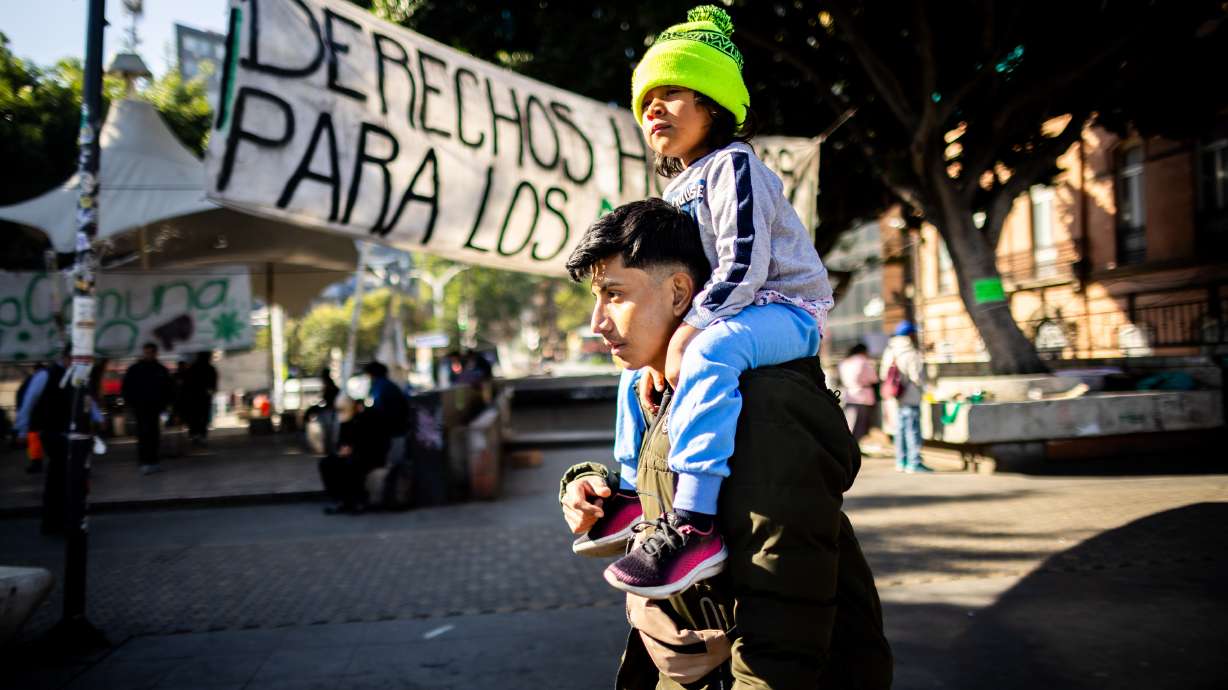Estimated read time: 5-6 minutes
- President Donald Trump's deportation focus prompts Mexicans in the U.S. to seek documentation affirming their connection to Mexico.
- The Mexican consulate in Utah has seen increased dual citizenship requests amid deportation fears.
- Immigrant advocates have launched an initiative to advise Mexicans of their rights in Mexico if they're deported.
SALT LAKE CITY — President Donald Trump's focus on deporting immigrants in the country illegally has prompted plenty of handwringing in the community and among their advocates.
It's also prompted a jump in the number of Mexicans and Mexican Americans in the United States seeking documentation attesting to their ties to Mexico in the event they're deported or otherwise forced to return south of the border.
"It's important to have up-to-date documents in case of any sort of eventuality, like voluntary repatriation or deportation," said Eduardo Baca, general consul at the Mexican Consulate in Salt Lake City.
He didn't offer specific numbers but said Mexico's consulates in Salt Lake City and other U.S. cities have experienced a "considerable increase" in the number of people seeking documentation, particularly dual citizenship, to affirm their connection to Mexico.
While U.S.-born children are not deportable, their parents, if here illegally, could face removal. Dual citizenship would permit the American kids of Mexican nationals to lawfully move to Mexico with their parents if deported. In some consulates, Baca said, the number of people filing paperwork to obtain Mexican citizenship has jumped 400%.
Pursuing dual citizenship is advised "for the minor children born in the United States to Mexican parents," Baca said. He also advises Mexican parents to get certified copies of their U.S.-born kids' birth certificates if they haven't registered their births with a Mexican consulate to make it easier to complete the citizenship process in Mexico.
"Having Mexican nationality facilitates access to education services, health and social programming in Mexico," he said.
Despite the Trump administration's high-profile focus on immigrants here illegally, it's not clear how extensive deportations actually are. The U.S. Department of Homeland Security said in late April, after Trump's first 100 days in office, that his administration — which decries immigrants here illegally as a safety risk and drain on public resources — had deported 135,000 people.
Researchers at Syracuse University's Transactional Records Access Clearinghouse, however, estimate the number of deported immigrants is around 72,000 and that deportations under Trump are on par with removals in fiscal year 2024 under President Joe Biden, his predecessor.

Whatever the case, the alarm is real in the immigrant community, and requests at Mexican consulates for dual citizenship aren't the only response in the Mexican community to the possibility of mass numbers of deportations to Mexico. The Mexican government launched an initiative, México Te Abraza, to welcome Mexicans back to the country.
The program, "Mexico Embraces You" in English, is meant to welcome Mexicans returning to the country from the United States "with kindness and humanism," reads Mexican government promotional material. Ten reception centers have been opened in northern Mexico near the U.S. border where deported Mexicans can get support and tap into a range of services.
"Mexican migrants aren't criminals. They crossed the border and contributed to the economy of that country and also contributed to their native country. They're hard-working people that push forward every day to get ahead," Mexican Interior Minister Rosa Icela Rodríguez said in January when announcing the program.
Once Noticias, a Mexican news outlet, reported last month that 38,000 Mexicans had benefited from the México Te Abraza program. Baca said 33,311 Mexicans had been "repatriated" from the United States to Mexico between late January, when Trump took office, and the end of last April.
'Green Cards'
Other advocates in Mexico of those potentially facing removal from the United States have launched their own initiative, mindful of the difficulties Mexicans and American kids of Mexicans can face on being deported or otherwise pressured into returning to Mexico.
Otros Dreams en Acción and Comunidad en Retorno, Mexican groups that work with those forced out of the United States to Mexico, have launched a campaign they call Tarjeta Verde, or Green Card in English. A Chicago-based group, the Coalition of Mexican Migrants, is also promoting the initiative.
The central focus of the effort is distribution of green-colored cards outlining some key rights in Mexico that are applicable to those returning to Mexico. The effort is modeled after "red cards" created by the U.S.-based Immigrant Legal Resource Center, an immigrant advocacy group, that spell out the rights of immigrants in the United States.

Some returning to Mexico mistakenly think their migratory problems are over "because we're no longer undocumented," Esme Flores Marcial, co-director of Otros Dreams en Acción, said last week during an online presentation on the Green Card initiative. But as some in the group have learned, "sometimes people are also undocumented here in Mexico."
Maria Dolores Unzueta of Comunidad en Retorno said sometimes identity documents issued by Mexican consulates in the United States aren't accepted in Mexico, requiring more bureaucratic hurdles to get the proper paperwork.
The campaign calls for distribution of the green cards in the United States, perhaps outside Mexican consulates, and along the northern Mexican border, where many of those deported first arrive after removal.
"On our return to Mexico, we hope to return with a minimum of rights only to discover that the identity documents issued by Mexican consulates are not accepted and rights like education are denied," reads promotional material for the Green Card campaign. That can have the effect of "reinforcing the feeling of living 'undocumented' and being once again in the shadows in our country of origin, too."









